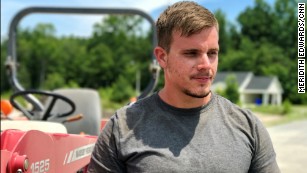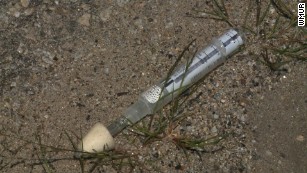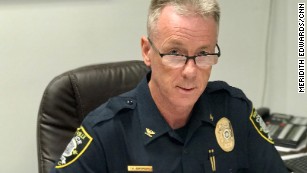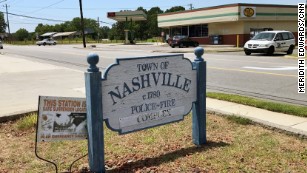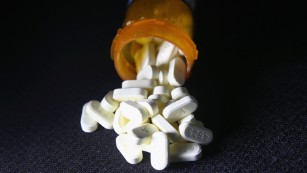Nashville, North Carolina (CNN)He’s only 24 years old, but he struggled with addiction for more than a decade. Thomas Spikes now owes his sobriety to none other than the chief of police in this small eastern North Carolina town.
“He saved my life for sure,” he said. “I owe a lot to him and the program.”
That program, called the HOPE initiative, is a collaboration between Nashville’s town manager, Hank Raper, and Chief Thomas Bashore. As deaths from opioids continue to dramatically rise across America, topping the list for unintentional deaths at a higher rate than car accidents, North Carolina saw more than a 340% increase from 2010 to 2016.
“There’s no clear characteristic of what a heroin or opioid addiction looks like. It’s not a white problem, it’s not a black problem, it’s not a Hispanic problem, middle class, working class, upper class. It affects all peoples of all walks of life,” Raper said.
So, the conversation began on how this small town of 5,400, where everyone knows their neighbors, could get ahead of the problem. The HOPE initiative, modeled after the innovative “Angel” program in Gloucester, Massachusetts, which opens the way for addicts to get police assistance and medical help without fear of arrest, is a way of rethinking law enforcement’s role in responding to this growing epidemic.
“They walk into the front door, if they have drugs or paraphernalia on them at any time, they can turn it in to us at that time, and have no charges filed. And we facilitate them into recovery,” Bashore said.
Drugs, but no arrest
So far the department has seen paraphernalia, syringes, cookers, pipes and injection “rigs” turned in. “We have actually had individuals who have brought in heroin bags and turned that over because they knew that they were going to get into recovery and they didn’t want that around when they got out,” Bashore said.
Possession of heroin in North Carolina is a felony charge and having paraphernalia is a misdemeanor. Bashore and Raper met with the county’s district attorney to ensure he was on board with not charging people. He was in full support.
HOPE, which is not an acronym but the town’s offer of help in capital letters, kicked off on February 9, 2016. Eight days into the program, the first addict came into the police department.
“It was eye-opening, recalled Bashore. “That individual came in and we spent the better part of 7½ hours getting him processed. Only then did I leave the hospital and come back to the police department to start calling facilities to start having him placed, after he left detox. You can spend hours on the phone, calling facilities, saying, “Do you have a bed?”
Chief escorts addicts to detox
Bashore has driven many of the 172 men and women of HOPE to a detox facility himself. He has built personal relationships with several rehabilitation facilities across the state that now alert him when there is space available. And the business card he passes out has his personal cellphone number.
“My cellphone, it rings all the time. Each participant who comes through the program and all their family members have it. So, when they need something, they reach out,” Bashore said.
HOPE has created a positive result between the police and the community. Bashore said he wants people to understand that substance abuse is a disease and the police department’s intention is to be “supportive not only for their benefit, but for the community benefit.”
Since the program began, Bashore said, crime is down 40% in the town, about 45 miles northeast of Raleigh. “We’ve had a pretty significant drop in our crimes that are associated with substance-abuse disorder. Things like shoplifting and larcenies and breaking into cars.”
HOPE is not limited to residents of Nashville. People from all over the state have walked through the police station doors, as well as people from California and Pennsylvania.
The program comes at no cost to the participants. It is funded through small grants, fundraisers and donations.
“The chief paid for the first two months that I was there and the rehab I was at,” recalled Spikes. Four months removed from rehab, he is now sober after being involved with drugs and alcohol for more than half his life.
Unlikely friendship
Spikes told CNN he first used drugs when he was 12 years old. “It started off with just smoking weed,” he said, “then occasional pills, and it progressed through the years.” His addiction became a $200 to $300 a day habit at its worst.
Heroin became his drug of choice. He was caught with it in October 2016 and sent to jail. His arrest led to his first encounter with Bashore.
Spikes was skeptical of police and their offer to help. “You don’t talk to cops, you don’t associate with them, they’re not your friends,” he said.
That changed quickly. Spikes said he recognized Bashore was solely there to help him, no questions asked. The chief “never tried to pry into anything in my life in that era,” Spikes said, “(He doesn’t) care who you hang out with, what kind of drugs you do.”
Spikes has cycled through countless rehab facilities, but said his life made a complete turnaround because of the chief and the HOPE initiative. “He saved my life for sure because if it wasn’t for the HOPE Initiative, I wouldn’t have gotten help.”
As he hops back on the tiller in the hot summer sun, he smiles and says, “My life has done a 180. I’m working, I have a vehicle, a house, I have a beautiful girlfriend with a baby on the way.”
And as for Bashore, he lives up to the name of his program. He hopes to continue to battle the opioid epidemic in his town, one addict at a time.



